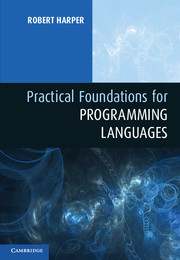Book contents
- Frontmatter
- Contents
- Preface
- Part I Judgments and Rules
- 1 Syntactic Objects
- 2 Inductive Definitions
- 3 Hypothetical and General Judgments
- Part II Statics and Dynamics
- Part III Function Types
- Part IV Finite Data Types
- Part V Infinite Data Types
- Part VI Dynamic Types
- Part VII Variable Types
- Part VIII Subtyping
- Part IX Classes and Methods
- Part X Exceptions and Continuations
- Part XI Types and Propositions
- Part XII Symbols
- Part XIII State
- Part XIV Laziness
- Part XV Parallelism
- Part XVI Concurrency
- Part XVII Modularity
- Part XVIII Equational Reasoning
- Part XIX Appendix
- Bibliography
- Index
1 - Syntactic Objects
from Part I - Judgments and Rules
Published online by Cambridge University Press: 05 February 2013
- Frontmatter
- Contents
- Preface
- Part I Judgments and Rules
- 1 Syntactic Objects
- 2 Inductive Definitions
- 3 Hypothetical and General Judgments
- Part II Statics and Dynamics
- Part III Function Types
- Part IV Finite Data Types
- Part V Infinite Data Types
- Part VI Dynamic Types
- Part VII Variable Types
- Part VIII Subtyping
- Part IX Classes and Methods
- Part X Exceptions and Continuations
- Part XI Types and Propositions
- Part XII Symbols
- Part XIII State
- Part XIV Laziness
- Part XV Parallelism
- Part XVI Concurrency
- Part XVII Modularity
- Part XVIII Equational Reasoning
- Part XIX Appendix
- Bibliography
- Index
Summary
Programming languages are languages, a means of expressing computations in a form comprehensible to both people and machines. The syntax of a language specifies the means by which various sorts of phrases (expressions, commands, declarations, and so forth) may be combined to form programs. But what sort of thing are these phrases? What is a program made of?
The informal concept of syntax may be seen to involve several distinct concepts. The surface, or concrete, syntax is concerned with how phrases are entered and displayed on a computer. The surface syntax is usually thought of as given by strings of characters from some alphabet (say, ASCII or Unicode). The structural, or abstract, syntax is concerned with the structure of phrases, specifically how they are composed from other phrases. At this level a phrase is a tree, called an abstract syntax tree, whose nodes are operators that combine several phrases to form another phrase. The binding structure of syntax is concerned with the introduction and use of identifiers: how they are declared and how declared identifiers are to be used. At this level phrases are abstract binding trees, which enrich abstract syntax trees with the concepts of binding and scope.
We do not concern ourselves in this book with matters of concrete syntax, but instead work at the level of abstract syntax. To prepare the ground for the rest of the book, this chapter begins by definining abstract syntax trees and abstract binding trees and some functions and relations associated with them.
Information
- Type
- Chapter
- Information
- Practical Foundations for Programming Languages , pp. 3 - 10Publisher: Cambridge University PressPrint publication year: 2012
